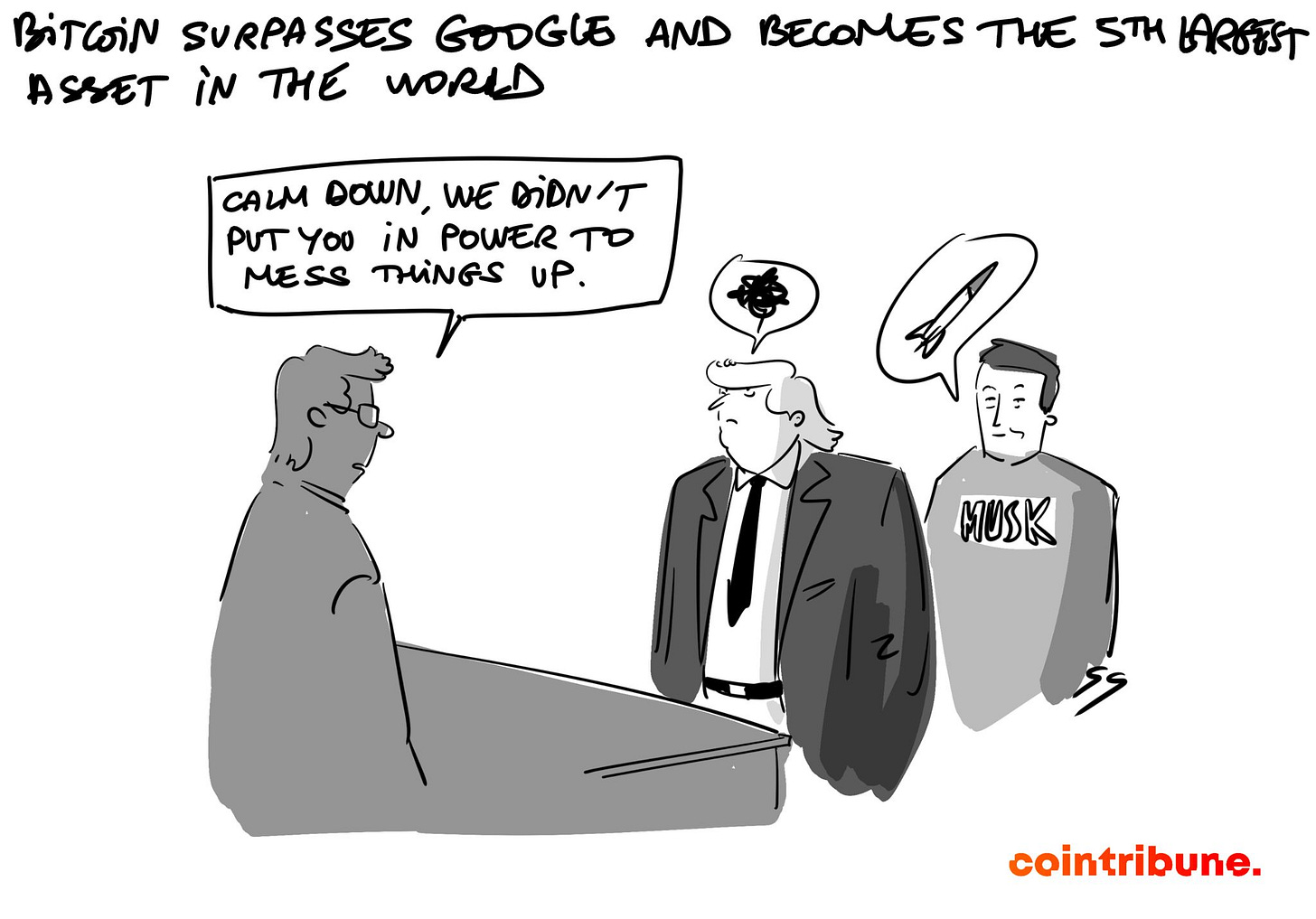Bitcoin surpasses Google and becomes the 5th largest asset in the world
Welcome to the Daily Tribune of Thursday, April 24, 2025 ☕️
Hello Cointribe! 🚀
Today, we are Thursday, April 24, 2025, and like every day from Tuesday to Saturday, we summarize the latest 24-hour news that you should not miss!
But first…
✍️ Cartoon of the day:
A quick look at the market…
🌡️ Temperature:
Stormy ⛈️
24h crypto recap! ⏱
📈 Bitcoin surpasses Google and becomes the 5th largest global asset
With a capitalization of 1,870 billion dollars, Bitcoin now surpasses Google in market value and ranks fifth among the largest global assets.
🏛️ Paul Atkins, new SEC chair, promises rational crypto regulation
Barely inducted, Paul Atkins announces a "rational and coherent" approach to regulate cryptocurrencies. He aims to make the United States a safe and favorable environment for the crypto industry.
🐶 SHIB tries to make a major breakthrough as Bitcoin accelerates
The Shiba Inu (SHIB) seeks to breach an important technical threshold, benefiting from Bitcoin's bullish momentum that stimulates the entire altcoin market.
🎨 Polygon outperforms Ethereum in the NFT market
Polygon records a weekly sales volume of 22.3 million dollars in NFTs, surpassing Ethereum and capturing 24% of the overall market.
Crypto of the day: DeXe (DEXE)
DeXe is a decentralized governance protocol designed to facilitate the creation and management of DAOs (decentralized autonomous organizations) in a meritocratic manner. It offers a modular infrastructure consisting of over 60 smart contracts, accompanied by a no-code interface, allowing users of all technical levels to launch and administer customized DAOs. Recently, DeXe has strengthened its presence on Ethereum, in addition to BNB Chain, thus enhancing its multi-chain ecosystem and participation in decentralized governance.
The token DEXE is at the heart of the DeXe ecosystem, serving as a governance and utility token. It enables holders to participate in protocol decisions, propose initiatives, and vote on network developments. DeXe also incorporates a buyback and automatic burning mechanism for tokens, thereby reducing the circulating supply and potentially increasing the value of remaining tokens.
Recent performance:
Current price: $13.54 USD
24-hour variation: -14.8%
Market capitalization: approximately $773.9 million
Rank on CoinMarketCap: #103
Are the United States ready to abandon the dollar for Bitcoin?
In a changing global economic context, the United States is considering challenging the hegemonic status of the dollar. Faced with persistent deficits and increased international competition, Bitcoin emerges as a potential strategic alternative.
The decline of the "exorbitant privilege" of the dollar
Historically, the dollar has benefited from an "exorbitant privilege" as the global reserve currency, allowing the United States to fund its deficits at lower costs. However, this position is increasingly contested. American officials, such as Stephen Miran, chairman of the White House Economic Council, believe that a strong dollar harms the country’s industrial competitiveness by making exports more expensive.
In this vein, a controlled depreciation of the dollar could favor domestic production and reduce the trade deficit. However, it would also involve relinquishing some advantages tied to current monetary dominance.
Bitcoin as a strategic alternative
With its limited supply and decentralization, Bitcoin is perceived by some as a potential store of value for the United States. Proposals are emerging to incorporate BTC into national reserves, or even to make it an international reserve currency. This transition could allow the United States to diversify its assets and strengthen its economic position in a multipolar world.
However, such a move would require regulatory adaptation and institutional acceptance of Bitcoin, which presents a major challenge.
The questioning of the "exorbitant privilege" of the dollar by the United States opens the way for profound monetary reforms. As a decentralized digital asset, Bitcoin could play a key role in this transformation. However, the transition to a new monetary era will require significant political, economic, and regulatory adjustments.🔗 Read the full analysis









